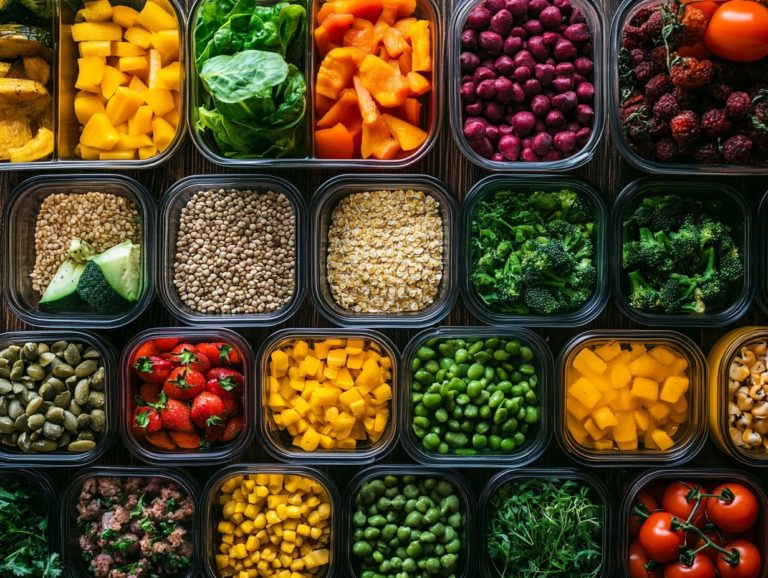The Impact of Meal Planning on Nutrition
Meal planning is more than just a trend; it is a powerful tool for enhancing your nutrition and overall well-being.
Organizing your meals in advance empowers you to make informed choices that match your dietary needs. Whether you aim for weight loss, muscle gain, or simply a healthier lifestyle, this guide provides a step-by-step approach to crafting effective meal plans.
You ll explore the many benefits of meal planning while navigating budgetary and time constraints. Discover strategies to keep yourself motivated and organized as you embark on your journey toward improved health.
Jump in and discover the secrets to successful meal planning!
Contents
Key Takeaways:
Meal planning helps improve nutrition and overall health by promoting balanced and intentional food choices. Creating a meal plan involves considering factors such as dietary restrictions, preferences, budget, and time constraints. Understanding the role of meal planning in healthy eating can further enhance your approach, and tailoring a meal plan to specific nutrition goals, such as weight loss or muscle gain, can lead to more successful outcomes.
The Importance of Meal Planning
Meal planning is essential for promoting healthy eating habits and enhancing your overall diet quality, enabling you to make informed food choices that suit your nutritional needs.
By organizing your meals in advance, you can minimize food waste, manage portion sizes, and easily include nutrient-rich foods in your routine.
This approach supports weight loss and helps you stay healthy while also reducing the stress linked to last-minute meal prep.
In Charlotte, North Carolina, registered dietitian Basheerah Enahora highlights meal planning as a foundational practice for anyone seeking balanced meals that cater to their dietary preferences.
Benefits for Nutrition and Health
Meal prepping and planning bring a wealth of benefits that enhance your nutrition and health, offering improved access to foods that are rich in essential vitamins and minerals and greater portion control.
By embracing these practices, you can enjoy a wider variety of dietary options, including healthy fats like avocados and nuts key components for your overall well-being. This approach not only minimizes the temptation of reaching for convenient yet less nutritious choices but also supports mindful cooking habits that elevate the flavor and quality of your meals.
With thoughtfully prepared meals readily available, managing your food consumption becomes effortless. It encourages regular eating schedules and helps prevent overeating. Therefore, meal prep is more than a time-saver; it is a cornerstone of a sustainable and healthy lifestyle.
How to Create a Meal Plan
Crafting an effective meal plan requires a thoughtful and methodical approach, guiding you through essential steps from choosing nutrient-rich foods to organizing a comprehensive grocery list.
Step-by-Step Guide
A step-by-step guide to meal planning begins with identifying your personal dietary needs, ensuring your meals are balanced and tailored to your goals.
Once you’ve established these needs, explore various cooking methods that complement your choices think grilling for lean proteins or steaming for vibrant vegetables.
Understanding portion sizes is equally important; it helps maintain balance and variety, preventing overconsumption while ensuring you meet your nutritional requirements.
Incorporating multiple food groups, especially fruits, grains, and proteins, leads to a well-rounded diet.
Efficiently managing your time and organizing your meals can greatly enhance the meal planning process, paving the way for weekly prep sessions that promote convenience and healthier choices throughout the week.
Factors to Consider in Meal Planning
When you embark on meal planning, think about several key factors that can significantly impact the effectiveness and sustainability of your meal prep journey.
Consider your dietary restrictions and personal preferences, as these elements will play a crucial role in shaping a plan that truly works for you.
Dietary Restrictions and Preferences
Accommodating dietary restrictions and personal preferences in your meal planning is essential for achieving a balanced diet and nurturing healthy eating habits. This consideration becomes particularly vital when navigating diverse requirements such as gluten-free, vegan, or low-carb diets.
By incorporating healthy foods that align with these dietary needs, you ensure that you receive the necessary vitamins and minerals while supporting your overall well-being.
For those on a gluten-free regimen, alternatives like quinoa and brown rice serve as excellent substitutes for grains like wheat. If you follow a vegan diet, focusing on legumes, nuts, and seeds can help fulfill your protein requirements. Low-carb enthusiasts might prioritize leafy greens and healthy fats.
Thoughtful meal planning allows you to balance macronutrients effectively. Each choice becomes a deliberate step toward healthier living.
Budget and Time Constraints
Effectively managing your meal budget and time constraints is essential for successful meal planning. This ensures you meet your nutritional needs without overspending or feeling overwhelmed.
Start by crafting a detailed grocery list that prioritizes staples and seasonal produce. This approach reduces costs and maximizes freshness in your meals.
Convenience foods, like pre-chopped vegetables or frozen meals, can cut down on prep time significantly while still offering nutritional benefits.
By incorporating these strategies, you can enhance your time management skills and promote emotional wellness. Meal prep can transform into a satisfying part of your daily routine.
Meal Planning for Specific Nutrition Goals
Meal planning can be customized to meet your specific nutrition goals, whether you aim for weight loss, muscle gain, or an overall enhancement of your health.
This approach aligns your food choices with your health objectives, ensuring every bite supports your journey toward a better you.
Weight Loss, Muscle Gain, and Overall Health
If you are striving for weight loss, muscle gain, or simply enhanced overall health, meal planning is an essential strategy that gives you the power to make mindful food choices.
By thoughtfully selecting healthy foods and balancing your main nutrients proteins, fats, and carbohydrates you can craft meals that not only quell your hunger but also support your fitness aspirations.
Incorporating lean proteins, whole grains, and a vibrant variety of vegetables enriches the nutritional profile of each dish, ensuring every bite is purposeful.
Don t shy away from experimenting with cooking methods like grilling, steaming, or roasting. These techniques can elevate flavors without piling on unnecessary calories, fostering a healthier relationship with food.
Prioritizing meal prep also helps you resist the lure of unhealthy snacks, paving the way for sustained energy levels throughout your day.
Tips for Successful Meal Planning
Successful meal planning relies on your ability to stay organized and motivated. When you master these elements, the once-daunting task of meal prep transforms into a delightful experience.
Staying Organized and Motivated
Staying organized and motivated is crucial for a successful meal planning experience. It allows you to effectively manage your food choices and preparation methods.
Employing smart organizational strategies, like using labeled meal containers, keeps your ingredients fresh and easily accessible. This streamlines the cooking process considerably.
Visual meal plans serve as daily or weekly reminders of what to prepare and help you stay focused on nutrition.
Consider setting personal goals perhaps trying a new recipe each week or committing to healthier eating habits. Involving family members can turn meal prep into a collaborative effort.
This fosters a supportive environment where everyone can share ideas and enjoy mealtime together.
Frequently Asked Questions
What is the impact of meal planning on nutrition?
Meal planning has a significant impact on nutrition. It allows for intentional and balanced meal choices, leading to better overall health and well-being, as highlighted in the science behind meal planning for nutrition.
How does meal planning affect daily food choices?
Meal planning helps individuals make more mindful and intentional food choices, leading to a healthier and more balanced diet.
What are the benefits of meal planning for nutrition?
Meal planning boosts your intake of nutrients and enhances portion control, while also adding variety to your meals, as explored in the psychology of meal planning.
Can meal planning help with weight management?
Meal planning promotes healthier choices and helps you manage portions. This leads to effective weight loss and maintenance.
How does meal planning save time and money?
By planning meals, you reduce food waste and avoid last-minute grocery trips. It also decreases the urge to eat out, saving you money.
Is meal planning suitable for all dietary preferences?
Yes! Meal planning can be customized for any diet or restriction. It’s a flexible way to enhance your nutrition and overall health.






